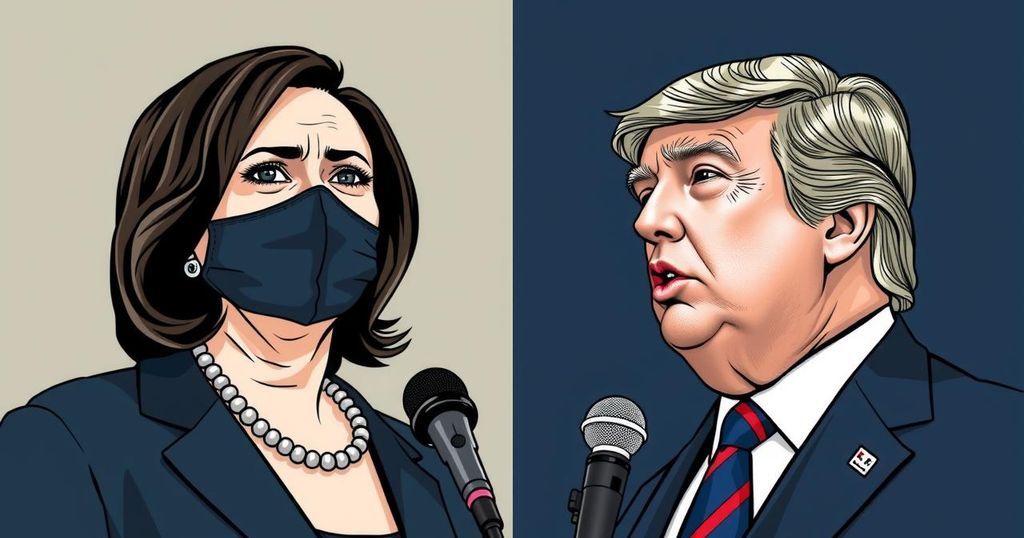International relations experts have conducted a survey highlighting significant differences in the anticipated foreign policy approaches of Vice President Kamala Harris and former President Donald Trump for the upcoming 2024 U.S. presidential election. The survey indicates that Harris would likely maintain U.S. commitments to international agreements and support foreign assistance, while Trump would pursue withdrawal from such agreements and increase tariffs. Overall, 92% of scholars believe Harris would more effectively manage U.S. foreign policy compared to Trump.
International relations (IR) experts have identified substantial distinctions between the foreign policy agendas and effectiveness of Vice President Kamala Harris and former President Donald Trump as the 2024 U.S. presidential election approaches. A recent survey conducted by the Teaching, Research, and International Policy Project at William & Mary, aided by the Carnegie Corporation of New York, involved responses from 705 IR scholars across U.S colleges and universities. Experts predict that a Harris administration would significantly differ from a Trump administration in critical areas including climate policy, international coalitions, and trade relations. Notably, the likelihood of the U.S. withdrawing from international agreements such as the Paris Agreement and NATO under a Trump presidency is perceived to be high—80% and 38%, respectively—while Harris is seen as almost guaranteed to retain these commitments. Experts also anticipate a considerable shift in nuclear cooperation with Iran, predicting a 35% chance of a new agreement with Harris versus a mere 7% with Trump. In trade matters, Trump is expected to pursue increased tariffs, with an 80% probability, while Harris presents a significantly lower 30% chance of similar actions. Similarly, the outlook for foreign aid highlights a striking contrast: experts estimate a 56% chance that aid would increase under Harris compared to only 20% under Trump. Furthermore, military assistance policies also differ substantially; with Trump likely to boost military aid to Israel and Harris more inclined to support Ukraine amidst ongoing conflict with Russia. Despite certain similarities on military intervention, experts largely favor Harris in terms of overall competency and effectiveness in navigating foreign policy. An overwhelming 92% of IR scholars surveyed believe that Harris would better manage the United States’ foreign relations, contrasting sharply with just 8% who feel the same about Trump. This trend persists even among some Republican respondents, indicating a bipartisan erosion of confidence in Trump’s capabilities. Finally, the survey demonstrated that the outcome of the November 5 election is expected to have lasting implications for U.S. foreign policy.
The significance of foreign policy in American presidential elections cannot be understated, as historical precedents show that election outcomes often shape the direction of U.S. engagements on a global scale. The ongoing 2024 election cycle is poised to present a pivotal choice between two distinct foreign policy ideologies embodied by Kamala Harris and Donald Trump. Through an extensive survey of international relations scholars, insights have emerged indicating that voter choice will carry substantial consequences for U.S. standing in international institutions and the extent to which the U.S. will engage in global partnerships. The expert opinion gathered in this survey reveals a clear division on key foreign policy issues, reflective of the contemporary geopolitical climate.
In summary, the insights provided by international relations experts illuminate the critical differences between Vice President Kamala Harris and former President Donald Trump regarding foreign policy. The evidence presented suggests that Harris would effectively maintain and perhaps enhance U.S. commitments to international agreements, while experts express significant skepticism about Trump’s approach. With implications that extend well beyond the election, the contrasting capabilities of the two candidates underscore the importance of the upcoming vote and its potential to shape the future of U.S. foreign relations on multiple fronts.
Original Source: foreignpolicy.com






